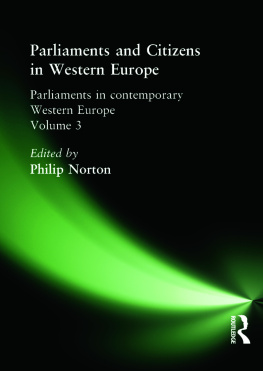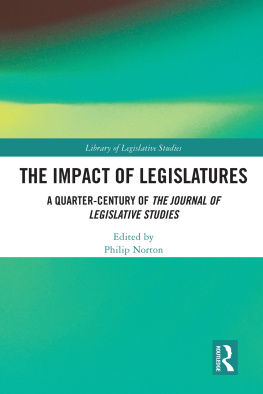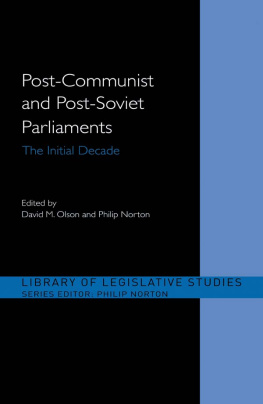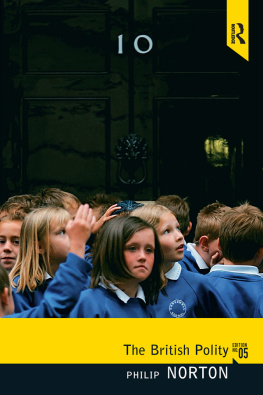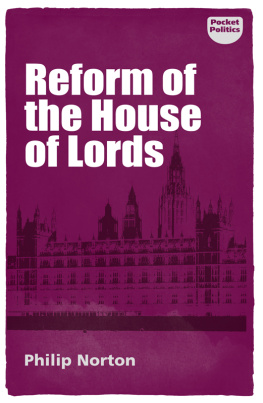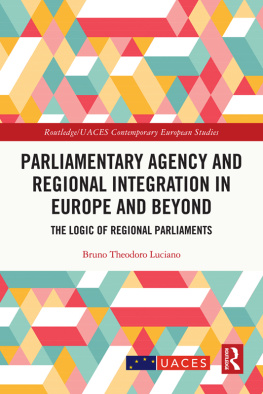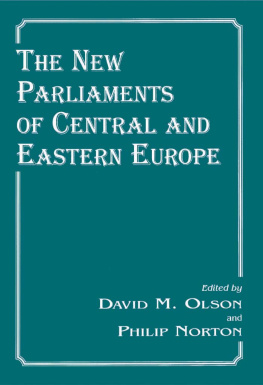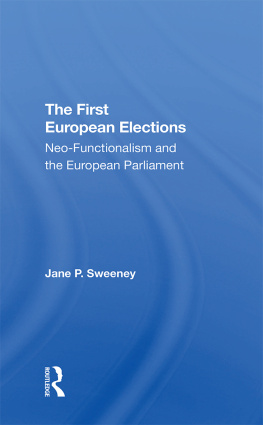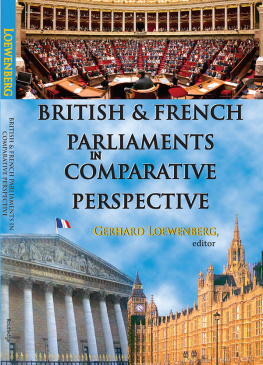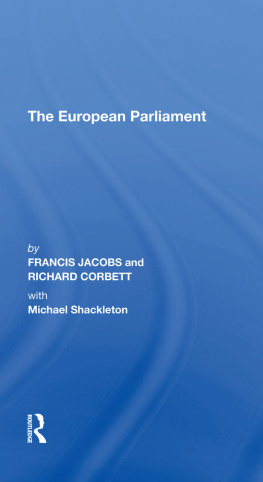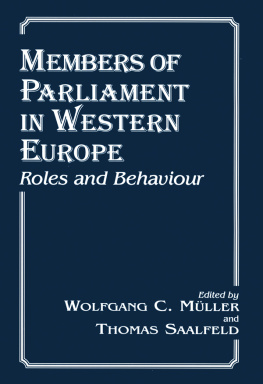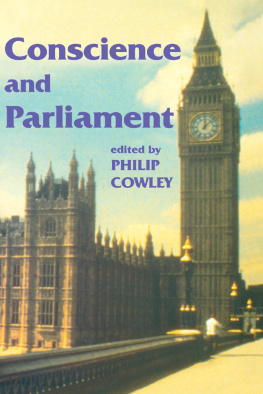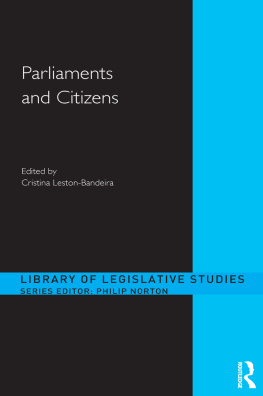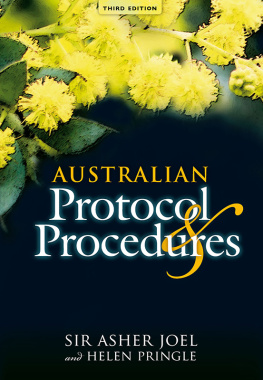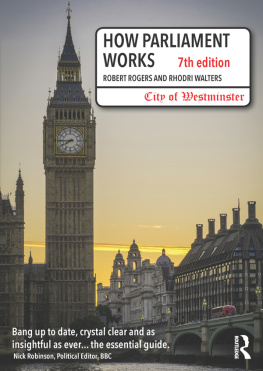PARLIAMENTS AND CITIZENS IN WESTERN EUROPE
THE LIBRARY OF LEGISLATIVE STUDIES
General Editor: Philip Norton
A series of new and recent books exploring the role of legislatures in contemporary political systems. The volumes typically draw together a team of country specialists to provide in-depth analysis.
Parliaments in Contemporary Western Europe
edited by Philip Norton
Volume 1: Parliaments and Governments in Western Europe
Volume 2: Parliaments and Pressure Groups in Western Europe
Volume 3: Parliaments and Citizens in Western Europe
Second Chambers
Edited by Nicholas D.J. Baldwin and Donald Shell
Delegation and Accountability in European Integration
The Nordic Parliamentary Democracies and the European Union
edited by Torbjrn Bergman and Erik Damgaard
The Uneasy Relationships between Parliamentary Members and Leaders
edited by Lawrence D. Longley and Reuven Y. Hazan
Parliaments in Asia
edited by Philip Norton and Nizam Ahmed
Conscience and Parliament
edited by Philip Cowley
The New Roles of Parliamentary Committees
edited by Lawrence D. Longley and Roger H. Davidson
Members of Parliament in Western Europe Roles and Behaviour
edited by Wolfgang C. Mller and Thomas Saalfeld
Parliaments in Western Europe
edited by Philip Norton
The New Parliaments of Central and Eastern Europe
edited by David M. Olson and Philip Norton
National Parliaments and the European Union
edited by Philip Norton
First published in 2002 in Great Britain by
FRANK CASS AND COMPANY LIMITED
Crown House, 47 Chase Side, Southgate
London N14 BP, England
and in the United States of America by
FRANK CASS
c/o International Specialized Book Services, Inc.
5824 N.E. Hassalo Street, Portland, Oregon 927213-3640
Website www.frankcass.com
Copyright 2002 Frank Cass & Co. Ltd
British Library Cataloguing in Publication Data
Parliaments and citizens in Western Europe. (Parliaments in contemporary Western Europe; v. 3)
1. Legislative bodies Europe, Western 2. Europe, Western Politics and government
I. Norton, Philip
328.39094
ISBN: 978-0-71464-835-4
Library of Congress Cataloguing-in-Publication Data
Parliaments in contemporary Western Europe / edited by Philip Norton, v. <1-3>; 23 cm. (The library of legislative studies)
Includes bibliographical references and index.
Contents: v. 1. Parliaments and governments in Western
Europe v. 2. Parliaments and pressure groups in Western
Europe v. 3. Parliaments and citizens in Western Europe
1. Legislative bodies-Europe, Western. 2. Europe, Western-Politics and government I. Norton, Philip. II. Series.
328.39094dc21 98-016206
All rights reserved. No part of this publication may be reproduced, stored in a retrieval system, or transmitted in any form, or by any means, electronic, mechanical, photocopying, recording or otherwise without the prior written permission of Frank Cass and Company Limited.
This volume constitutes the third and final volume in the series exploring the relationship between parliaments and key actors in the political process. The focus of this work is the relationship between parliaments and citizens. The relationship between members of parliaments and the people they are elected to serve in the legislature has been much neglected in the literature. We know much about the relationship between legislatures and executives but relatively little about the relationship between the legislature and citizens. This collaborative volume, looking at the relationship in a number of countries in western Europe, is designed to contribute towards filling the gap.
I am extremely grateful to all the contributors for the work they have done to bring this volume to fruition. Most of them contributed to one or both of the other volumes in the series. I am also grateful to Frank and Stewart Cass for their commitment to the project. The Library of Legislative Studies published by Frank Cass I declare an interest as General Editor of the series now contains a significant number of works and I believe is doing much to push forward our knowledge and understanding of the role of legislatures in contemporary society. This volume seeks to contribute to that process.
The feedback from readers of the preceding volumes in the series has been very positive. My fellow contributors and I are always pleased to receive comments and suggestions.
PHILIP NORTON
Centre for Legislative Studies, University of Hull
Vincent Della Sala is Associate Professor of Political Science at Carleton University, Ottawa.
Lieven de Winter is Lecturer in the Dpartment de Sciences Politiques et Sociales at the Universit Catholique de Louvain and in the Faculteit Sociale Wetenschappen at the Katholieke Universiteit, Brussels.
Cristina Leston Bandeira is a Lecturer in Politics at the University of Hull.
Philip Norton (Lord Norton of Louth) is Professor of Government and Director of the Centre for Legislative Studies at the University of Hull.
Eunan OHalpin is Professor of Government at Dublin City University.
Thomas Saalfeld is Senior Lecturer in Politics at the University of Kent at Canterbury.
Roger Scully is Lecturer in European Politics at the University of Wales, Aberystwyth.
Mark Shephard is Lecturer in Politics at Strathclyde University.
Philip Norton
Legislatures have one core defining function: that of giving assent to measures that, by virtue of that assent, are to be binding on society.
The increased prominence of legislatures has prompted a greater scholarly interest in their existence and what they do. There is a growing body of literature analysing the role of parliaments in the transition from one regime to another. There is some literature now on the role of national legislatures in the development of the European Union. There has also been some attempt to look at institutional change within established legislatures. Cross-national studies constitute a welcome advance in the study of legislatures. They help us better understand the species of institution that is so pervasive. Yet such works constitute the poor relation within the field of legislative studies. They are dwarfed by the sheer body of writings on specific legislatures. We know a great deal about particular legislatures but very little about legislatures as legislatures. There is a mass of literature on the US Congress, analysing the institution from many perspectives, yet relatively little of that literature helps us generalise about legislatures. The literature that does help advance our understanding of legislatures as a particular species of institution is sometimes excellent but it is notable for its scarcity.
Two principal conclusions flow from these brief introductory observations. The first is that legislatures are worthy of study. Their sheer number and historical persistence justifies some attention. The second is that such study has to be undertaken on a cross-national basis. That provides the basis for this study. The literature on legislatures also helps shape the focus and structure of the study. Though some parliaments are well studied, not least the British Parliament, the parliaments of western Europe have not been the subject of much cross-national study in recent years. An earlier volume,

